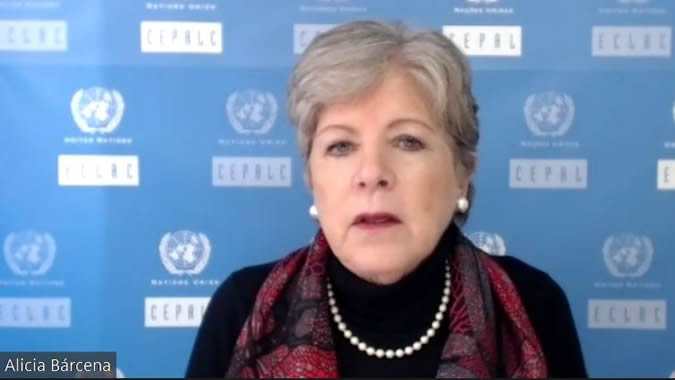Parliaments are Relevant Actors for Convening a New Fiscal and Social Compact: Alicia Bárcena
Work area(s)
At a virtual meeting of parliamentarians from throughout the region, ECLAC’s Executive Secretary stressed the importance of having more efficient and open legislative bodies to tackle the crisis related to the COVID-19 pandemic.

Parliaments are relevant actors for convening a new fiscal and social compact and for forging agreements to reformulate the current economic model and build a more inclusive and sustainable welfare system, Alicia Bárcena, Executive Secretary of the Economic Commission for Latin America and the Caribbean (ECLAC), sustained today during a virtual meeting of parliamentarians from throughout the region.
The gathering, entitled “Legislating for Post COVID-19 Economic Recovery: Cooperative dialogue between presiding officers of parliaments of the Americas,” was convened by the ParlAmericas organization and drew the participation of 15 parliamentary presidents and/or vice presidents from countries in the region, along with 27 panelists. This activity was presided over by assembly member Elizabeth Cabezas (of Ecuador), the President of ParlAmericas, and it began with a keynote lecture by Alicia Bárcena on COVID-19’s economic and social effects in Latin America and the Caribbean.
In her presentation, ECLAC’s Executive Secretary stressed the importance of having more effective, efficient and open legislative bodies to confront the crisis related to the COVID-19 pandemic. “Our societies demand more and better access to timely and reliable information, and better institutions for participating in the decisions that affect them and for guaranteeing governability. It is necessary to open institutional channels for dialogue and advocacy by civil society to achieve support and comprehension, as well as to steer the process after the crisis,” she indicated.
In this vein, she stated that ECLAC is putting at countries’ disposal the public policy observatories that it has developed, in particular the COVID-19 Observatory with all its publications regarding the effects of the pandemic, the Gender Equality Observatory, and the Observatory on Principle 10, in line with the Escazú Agreement (for which the Commission serves as the Technical Secretariat).
Alicia Bárcena underscored that the parliaments of Latin America and the Caribbean have played an important role during the pandemic, raising the visibility of political debate and social demands, and taking an active role in modifications, approval and oversight of public budgets. She emphasized that due to their democratic and representative nature, parliaments provide a natural space for deliberation to arrive at agreements regarding how to reformulate the current economic model and convene a broad social compact that would allow for building a more inclusive welfare system.
“After this crisis, we will need institutional channels for listening to and processing the multiple demands that will emerge as a result of the serious economic and social effects of COVID-19, and parliaments will be crucial at that crossroads,” the senior United Nations official asserted. “A Welfare State is needed that is based on a new social (fiscal, social and production-related) compact that includes the universalization of access to health, which is to say, to the basic infrastructure of life.”
For these efforts, Bárcena indicated, parliamentary leadership will be critical to give democratic and political legitimacy to the post-pandemic process of economic and social recovery and rebuilding.
In her presentation, Alicia Bárcena reiterated that the post COVID-19 world will require more cooperation and regional integration. “The world is going to change, and it is already changing. The big companies are moving, they are seeking resilience more than efficiency. We have to be very mindful of what role Latin America and the Caribbean will play in this. We must aim for the region’s future in this new economic geography to depend less on imported manufactured goods and imagine regional value chains,” she explained.
Bárcena also informed the participating parliamentarians about the proposals for confronting the pandemic that ECLAC has provided to countries. In the immediate short term, the Commission proposes implementing a basic emergency income (BEI) equivalent to one poverty line over a six-month period for the population living in poverty, which would have an additional cost equivalent to 2.1% of GDP. Also in the near term, it is necessary to avoid the destruction of productive capacity by using subsidies, differentiating them by company size, with a commitment to preserving employment relationships.
In the medium term, ECLAC proposes formulating responses for a post-COVID world that will bring about changes to the model and the production structure, with greater equality and sustainability, the establishment of a Welfare State, and the fostering of regional integration in a new economic geography, the organization’s Executive Secretary stated.
“The transformation of the development model is urgently needed to achieve a better recovery with resilient, inclusive and sustainable economies. This must include an energy transition towards renewable, efficient sources with a smaller environmental footprint, more employment and national production,” Bárcena indicated. In this area, the 2030 Agenda for Sustainable Development and its 17 Goals provide a road map that is historic and transformative, with universal, comprehensive and indivisible goals. This is a participatory agenda, which presents a vision for a future with equality and sustainability, she added.
Finally, Alicia Bárcena said that strengthening the work of parliamentarians is essential for vigorously fighting the pandemic’s effects. “I invite you to think about the future, about how we can build a better future: with more inclusive welfare systems, green sustainability, attracting companies so they act with more solidarity, and about how we can move towards strategic sectors that would enable us to have greater social and environmental sustainability,” she concluded.
Related content
Los Efectos Económicos y Sociales del COVID-19 en América Latina y el Caribe
Presentación de Alicia Bárcena, Secretaria Ejecutiva de la CEPAL, en el evento Legislando para la recuperación económica frente al COVID-19. Diálogo cooperativo entre las y los presidentes de los…
Related link(s)
Country(ies)
- Latin America and the Caribbean
Contact
Public Information Unit
- prensa@cepal.org
- (56 2) 2210 2040